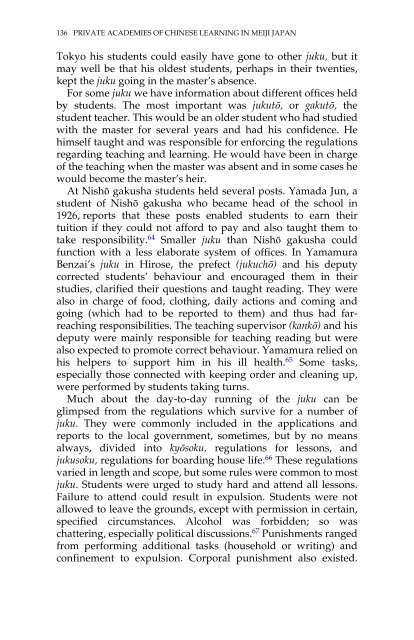Private Academies of Chinese Learning in Meiji Japan: The Decline ...
Private Academies of Chinese Learning in Meiji Japan: The Decline ...
Private Academies of Chinese Learning in Meiji Japan: The Decline ...
You also want an ePaper? Increase the reach of your titles
YUMPU automatically turns print PDFs into web optimized ePapers that Google loves.
136 PRIVATE ACADEMIES OF CHINESE LEARNING IN MEIJI JAPANTokyo his students could easily have gone to other juku, but itmay well be that his oldest students, perhaps <strong>in</strong> their twenties,kept the juku go<strong>in</strong>g <strong>in</strong> the master’s absence.For some juku we have <strong>in</strong>formation about different <strong>of</strong>fices heldby students. <strong>The</strong> most important was jukutō, or gakutō, thestudent teacher. This would be an older student who had studiedwith the master for several years and had his confidence. Hehimself taught and was responsible for enforc<strong>in</strong>g the regulationsregard<strong>in</strong>g teach<strong>in</strong>g and learn<strong>in</strong>g. He would have been <strong>in</strong> charge<strong>of</strong> the teach<strong>in</strong>g when the master was absent and <strong>in</strong> some cases hewould become the master’s heir.At Nishō gakusha students held several posts. Yamada Jun, astudent <strong>of</strong> Nishō gakusha who became head <strong>of</strong> the school <strong>in</strong>1926, reports that these posts enabled students to earn theirtuition if they could not afford to pay and also taught them totake responsibility. 64 Smaller juku than Nishō gakusha couldfunction with a less elaborate system <strong>of</strong> <strong>of</strong>fices. In YamamuraBenzai’s juku <strong>in</strong> Hirose, the prefect (jukuchō) and his deputycorrected students’ behaviour and encouraged them <strong>in</strong> theirstudies, clarified their questions and taught read<strong>in</strong>g. <strong>The</strong>y werealso <strong>in</strong> charge <strong>of</strong> food, cloth<strong>in</strong>g, daily actions and com<strong>in</strong>g andgo<strong>in</strong>g (which had to be reported to them) and thus had farreach<strong>in</strong>gresponsibilities. <strong>The</strong> teach<strong>in</strong>g supervisor (kankō) and hisdeputy were ma<strong>in</strong>ly responsible for teach<strong>in</strong>g read<strong>in</strong>g but werealso expected to promote correct behaviour. Yamamura relied onhis helpers to support him <strong>in</strong> his ill health. 65 Some tasks,especially those connected with keep<strong>in</strong>g order and clean<strong>in</strong>g up,were performed by students tak<strong>in</strong>g turns.Much about the day-to-day runn<strong>in</strong>g <strong>of</strong> the juku can beglimpsed from the regulations which survive for a number <strong>of</strong>juku. <strong>The</strong>y were commonly <strong>in</strong>cluded <strong>in</strong> the applications andreports to the local government, sometimes, but by no meansalways, divided <strong>in</strong>to kyōsoku, regulations for lessons, andjukusoku, regulations for board<strong>in</strong>g house life. 66 <strong>The</strong>se regulationsvaried <strong>in</strong> length and scope, but some rules were common to mostjuku. Students were urged to study hard and attend all lessons.Failure to attend could result <strong>in</strong> expulsion. Students were notallowed to leave the grounds, except with permission <strong>in</strong> certa<strong>in</strong>,specified circumstances. Alcohol was forbidden; so waschatter<strong>in</strong>g, especially political discussions. 67 Punishments rangedfrom perform<strong>in</strong>g additional tasks (household or writ<strong>in</strong>g) andconf<strong>in</strong>ement to expulsion. Corporal punishment also existed.













